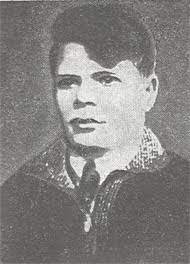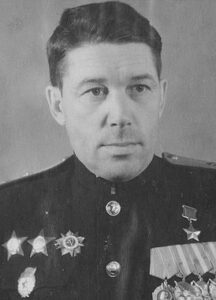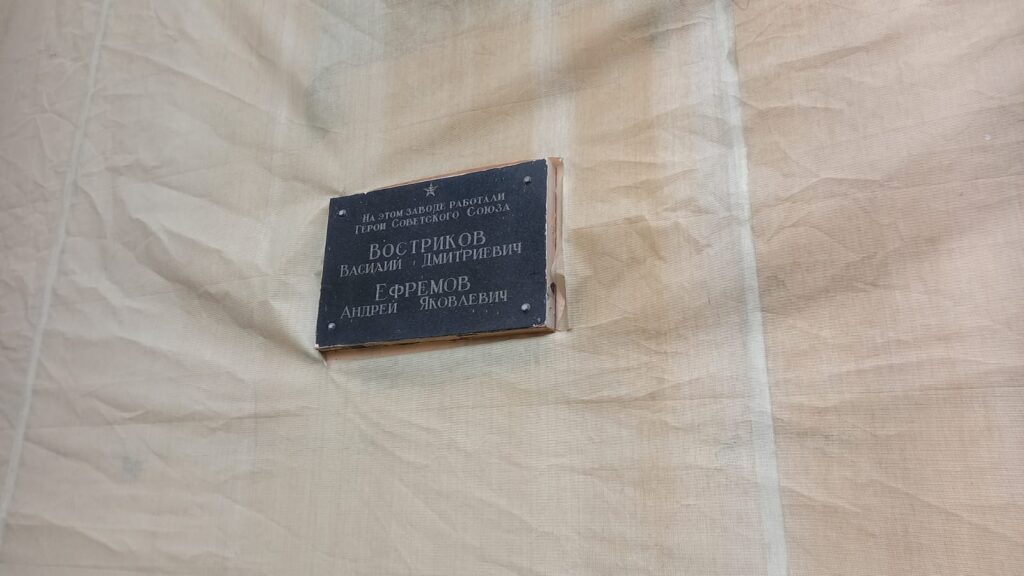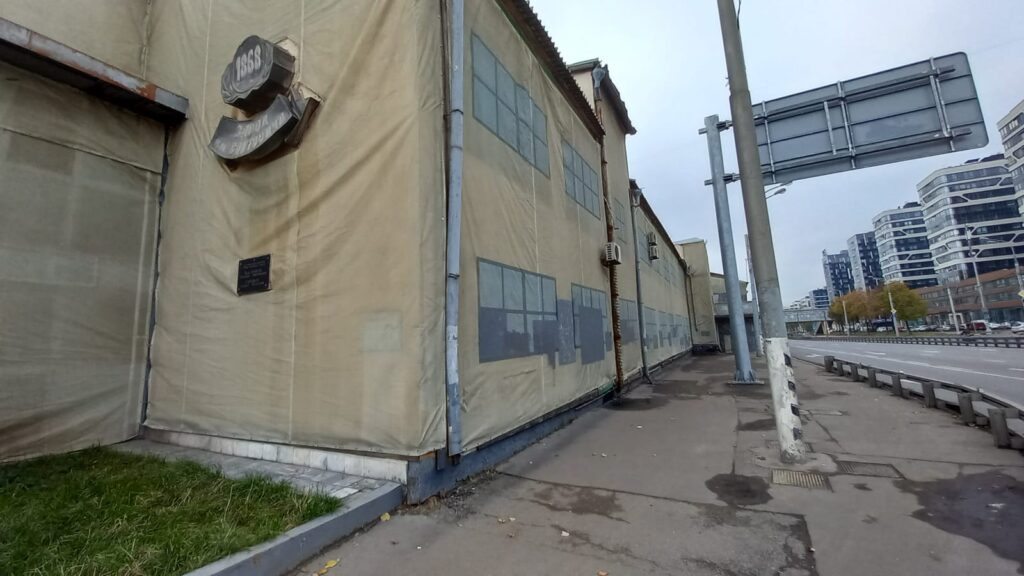Vasily Dmitrievich
Vostrikov
1910-1945

Vasily Dmitrievich Vostrikov was a senior sergeant of the Workers’ and Peasants’ Red Army, tankman, participant of the Great Patriotic War, Hero of the Soviet Union (1945). Vasily Vostrikov was born in 1910 in Moscow in a working-class family. He received an incomplete secondary education, was a locksmith’s apprentice, then a toolmaker at the Voitovich factory (memorial plaque at 4c7A on the Enthusiasts Highway), and later – at the First Moscow Watch Factory. In 1932-1935 he served in the Workers’ and Peasants’ Red Army. Since the late 1930s. Vostrikov lived in the Urals and in the city of Kungur, Perm region, worked as a locksmith at a tannery. In 1943, he was called up again to serve in the army. Since 1944 he was on the fronts of the Great Patriotic War, with the rank of senior sergeant, he was a tank driver of the 126th tank Regiment of the 17th Guards Mechanized Brigade of the 6th Guards Mechanized Corps of the 4th Tank Army of the 1st Ukrainian Front. Distinguished himself during the liberation of Poland. In the second half of January 1945 Vostrikov, along with the crew of his tank, destroyed two anti-tank and two assault guns, three armored personnel carriers, as well as a large number of enemy soldiers and officers in the battles on the approaches to the Oder. He was one of the first in his unit to reach the Oder near the settlement of Keben (now Hoben, Poland) and crossed to the west bank of the river. In the battles on the Vostrikov bridgehead, maneuvering, destroyed enemy firing points. On February 4, 1945, he was killed in a battle for the village of Mlich (now it is Mleczno, gmina Rudna, Lubin County, Lower Silesian Voivodeship, Poland). He was buried in Hoben. By the Decree of the Presidium of the Supreme Soviet of the USSR dated April 10, 1945, Senior Sergeant Vasily Vostrikov was posthumously awarded the high title of Hero of the Soviet Union for “exemplary performance of combat missions of the command at the front of the fight against the German invaders and bravery and heroism shown at the same time.” He was also awarded the Orders of Lenin and the Red Star.
Andrey Yakovlevich
Yefremov
1910-1985

Andrey Yakovlevich Efremov was a Soviet naval aviation pilot, a participant in the Soviet–Finnish and Great Patriotic Wars. He was a Hero of the Soviet Union, Colonel. He was born on August 26 (September 8), 1910 in the village of Lazinka of the Skopinsky district of the Ryazan province (now the Skopinsky district of the Ryazan region). From 1926 he worked on the Moscow-Kursk Railway, then at the Moscow Wagon Repair Plant named after Voitovich. Member of the CPSU(b) since 1931. In March 1932, Yefremov was called up to serve in the Workers’ and Peasants’ Red Army. In 1933 he graduated from the 3rd military school of pilots named after K. E. Voroshilov in Orenburg. From December 1933 he served in the 121st Aviation Squadron of the 105th Aviation Brigade of the Baltic Sea Naval Air Force: pilot, junior pilot, ship commander, flight commander. In 1939 he graduated from the Lipetsk Aviation Advanced Training courses of the Red Army Air Force. Participated in the Soviet-Finnish war. He fought as a flight commander of the 1st mine-torpedo Aviation Regiment of the 63rd Fighter Aviation Brigade of the Baltic Fleet Air Force. He carried out 38 sorties to bomb objects in the deep rear of the Finns, including participated in the bombing of the city of Helsinki. He was awarded the Order of Lenin. Since August 1940, he commanded a link in the 1st mine-torpedo regiment of the KBF Air Force, since September – squadron commander. Since June 1941 – on the fronts of the Great Patriotic War, with the rank of captain, he commanded the squadron of the 1st mine-torpedo aviation regiment of the 8th Air Brigade of the Baltic Fleet Air Force. By the beginning of August 1941, he had completed 26 sorties, sank 2 enemy vessels. At the beginning of August 1941 He became one of the pilots who were assigned to carry out the first bombing of Berlin. On the night of August 7-8, he flew on a mission at the head of the third air group after the groups of Colonel E.N. Preobrazhensky and Captain V.A. Grechishnikov. The bombers took off from the island of Saaremaa, the flight took place in extremely difficult conditions, with the temperature outside about 46 degrees below zero. Nevertheless, Efremov successfully reached Berlin and dropped bombs on targets. In August 1941, he carried out 5 sorties to bomb Berlin and 1 sortie to bomb Danzig. By the decree of the Presidium of the Supreme Soviet of the USSR dated August 13, 1941, for “exemplary performance of combat missions of the command and heroism and courage shown at the same time”, Captain Andrey Yefremov was awarded the title Hero of the Soviet Union with the award of the Order of Lenin and the Gold Star medal. Since September 1941, as part of the regiment, he participated in the defense of Leningrad. He made sorties to bombard German facilities in Pskov and other cities, set up minefields in the Baltic, on the night of May 2, 1942, sank a large transport in the port of Kotka with a direct hit. In June 1942 transferred to the Black Sea Fleet and appointed deputy commander of the 36th mine-torpedo aviation Regiment of the 63rd Heavy Bomber Aviation Brigade of the Fleet Air Force, and in June 1942 was appointed commander of the regiment. Under his command, the regiment participated in the defense of Sevastopol, in air raids on Yalta and other bases of the light naval forces of Germany and its allies in the Crimea, in the Battle for the Caucasus, in the fight against German-Romanian shipping on the Black Sea, in the bombing of Constanta, in the Novorossiysk-Taman and Crimean offensive operations. In May-June 1944, the regiment was relocated to the Northern Fleet, where it participated in the Petsamo-Kirkenes offensive operation. From November 1944 to March. In 1945, Lieutenant Colonel A. Ya. Efimov commanded the 5th mine-torpedo Aviation Division of the Northern Fleet Air Force, which fought against German ships in the Barents Sea and off the coast of Norway. In the summer of 1945, the regiment was transferred to the Pacific Fleet and participated in the Soviet-Japanese War. After the end of the war, he continued to serve in the USSR Navy. Until January 1949, he commanded the same regiment. In 1949 he graduated from the Higher Officer Flight Tactical Courses of the Naval Aviation (Riga). From November 1949 he served as assistant commander of the 5th mine-torpedo Aviation Division of the Northern Fleet Air Force, from May 1950. – deputy commander of this division. From May 1952 to December 1953, he commanded the 1st mine-torpedo Aviation Regiment, which was attached to the Highest Officer Flight Tactical Courses of the Navy. In 1954 he graduated from advanced training courses for commanders and chiefs of staff of air divisions at the Air Force Academy. Since March 1959 – Commander of the 20th Training Aviation detachment of the Baltic Fleet Air Force, since October 1963 – Head of the 125th School of Aviation Mechanics. Since June 1964, Colonel A. Ya. Efremov has been in reserve. He lived in Moscow, worked as the director of the Zhdanovsky Park, then as a lecturer of the Znanie Society. Later he moved to Riga.
Address: Moscow, Enthusiasts highway, 4, p. 7A

